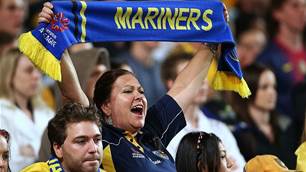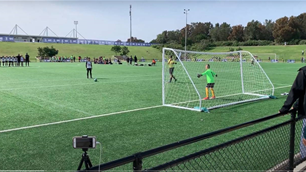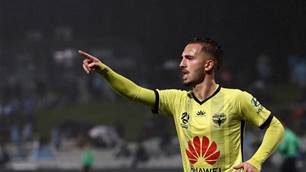EXCLUSIVE: A-League’s new head Lyall Gorman says strong community focus will be vital as he looks to help grow the competition after his successful stint at start-up A-League franchise Central Coast.
Following a successful 30-year career in business, Gorman turned his attention to the Mariners in late 2004. Since then, he's been instrumental in the setting up and running of one of the A-League success stories - a franchise started in virgin territory that's gone on to lead the way with their community engagement model and financial shrewdness.
In many ways Gorman is the perfect choice as new A-League boss. He is from within the A-League football family, knows the league intimately, is hugely passionate about football and has the runs on the board at Central Coast - one of the best-run, most community-focused franchises in the A-League.
It's this experience that FFA hopes will help take Aussie football - and the A-League - to greater heights in coming years in Gorman's role as successor to Archie Fraser as A-League boss.
Just two days into his new job, excited Gorman spoke to au.fourfourtwo.com about the future of the A-League and his vision to grow it over the coming years...
Lyall, what attracted you to this new role?
I think the opportunity to make a difference to the sum of the parts is what attracted me. I believe this is one of the greatest sporting opportunities in Australia, the on-going development and growth of football. It's a future that's never been stronger.
Who'd have thought five or ten years ago we'd even be talking about bidding for a World Cup? And be serious contenders to host one? And with a national league with 11 teams and a 12th one about to come in as well as the Matildas winning an Asian Cup? Who'd have believed that five or ten years ago? The foundations today are stronger than they've ever been.
The world's our oyster, and to be able to contribute to that, for me, is an honour.
What's the vision?
There's plenty of work to be done, no doubt. But the platform is strong, the vision is strong and the ownership model and passion and commitment shown by our clubs in a private equity model is strong. There's a lot to work with and build on.
I've always seen us as caretakers of the game. We've got to leave it in a better place, which is my goal and my role, and if I can add value to the whole, then that'd be wonderful and a legacy for the youth and their children of the future.
Also, we don't want to lose that intellectual property of players who've been overseas for a long time. We want to capture that and bring it back to help us grow with that incredible intellectual property. So there's plenty of room to work hard on that Australian marquee concept.
I think the overall pathway is important. We've got to activate this national curriculum and get that flowing down through our member federations and their associations so it flows up to the club level.
I coach a couple of U9 sides so I know what it's like with volunteer dads. And while there's wonderful intent from time to time if we can really enrich that level that'd be good. There's Project 22 at that level too to encourage and help.
We've got an emerging pipeline of talent development with the NYL and pathways, too. And our W-League is incredibly exciting particularly with our win on Sunday in the Asian Cup.
What are the challenges in the short- and long-term?
Obviously we're into another expansion phase with Melbourne Heart coming in, which I think will be tremendously good for the game. The local derby will bring a bit of tribalism into the Melbourne market. Then Sydney Rovers, who'll bring a tremendous competitive edge to the Sydney market as well as the Central Coast market. The challenge is to bed down those clubs well and the expansion program.
Obviously also for the current clubs it is to remain focused on their financial model and the community model - to get the balance right between a revenue model and one based around community and grassroots.
Grassroots is the wonderful opportunity we have in football. You know the numbers we have. If we can really engage our communities, fan-base become tribalistic which can be done over time. And we've got to be aware that you don't build a sense of history and tradition in five years. It takes time to grow.
And we've also got to look at the event day experience and make sure it's a place where fans can really engage emotionally because support is the key to our future success with the fans with the derbies and tribalism - it is that emotional connection between the clubs, players and fans.
We want fans to become part of clubs' journeys year in year out.
Also, we want to continue to enrich the business acumen of the clubs. I've always maintained we're not running football clubs we're in the business of football clubs and there's a key distinction, a mindset that we're in the business of football and not just a football club.
So I think there's an opportunity to further enrich that business acumen across the league.
Melbourne Heart, what's your take on the new club's progress thus far?
I think it's wonderful that they understand fully the model with their community engagement model and Westpac sponsorship... and they've got some clever people down there with Scott [Munn] and John [Didulica] and Peter Sidwell. There's no doubt they're going to bring some benchmarks into the game which will challenge others and make other [clubs] ask questions internally about what is the right model.
I have no doubt and I'm a firm believer that community engagement is one of the key influences of a successful sporting club.
Speaking of expansion clubs, what's your view on the number of A-League clubs? Do we need even more than, say, 12?
Well, this is a personal view and not from a board level, so putting it into that context my view today is that we have a real opportunity to bed down a 12-team competition and work hard over the next few years to get that right and strong. Then we can look at the model again.
I think in Australia there's a reasonable three-year plan so if we had 12 strong, viable clubs in a national competition and hopefully even increase our representation in the Asian Champions League I think we'd have a wonderful model to look to grow.
But on a personal basis, I think we should sit there for a while and get this model right and think strategically and bed down what we've got and get that right and strong before we start to move forward again.
Talk us through the effects of getting - or not getting - a World Cup on the A-League?
Obviously exciting times ahead if we do win that bid with the light at the end of that tunnel being massive, but it's not doomsday if we're not successful. We're into our second World Cup and ranked around 20 in the world. All our eggs aren't in that [World Cup] basket.
Describe your management approach?
In the past [with the Mariners] I've worked closely with other clubs. Clubs are our partners. It's not an us-and-them mentality. It's that unity of purpose and linking of arms and to find out the issues and work closely with them. That'll be my vision from a club perspective to engage and consultation and work with them on their business models. We want 12 strong teams so we want consultation and be prepared to listen and understand what the real issues are.
But most of all, this is a partnership, not an us-and-them model. And I think the feedback from the clubs so far has been very positive and that's encouraging and very affirming for me and given me a lot of confidence to go into the role to know that there'll be a level of trust and respect that we can build on.
You really sound ready for the challenge...
Absolutely. I sat down with Ben Buckley yesterday and it was the first time I've had a chance to think about this [job] and I'm incredibly excited and proud to be part of it. Hopefully I can make a difference as part of a team. It's not about me but the whole team.
Your appointment is a feather in the cap for the Mariners?
Certainly the Mariners have taken it that way but I don't focus on that too much. It's not about me, my goal from day one of becoming involved in football as an investor in the Mariners was to add value to a game I've believed in for a long time.
I see a lot of positives but I'm not sitting here in this chair pretending it's easy. However, if we engage all the key stakeholders with a unity of purpose and a linked arms approach to the challenges ahead, the world's our oyster.
Related Articles

Revealed: New buyer’s pitch to reinvigorate A-League's Mariners

Fresh talent flock to ambitious A-League outfit's pro pathway













